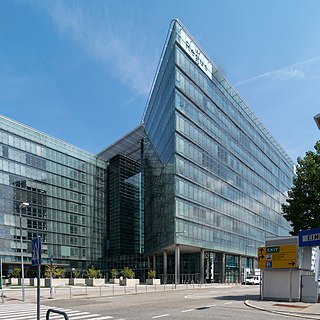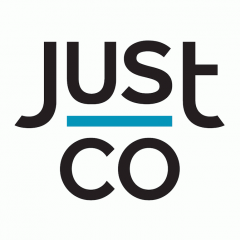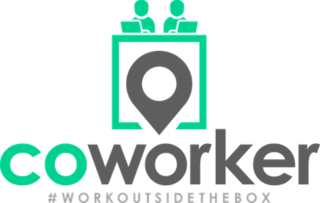Related Research Articles

A web hosting service is a type of Internet hosting service that hosts websites for clients, i.e. it offers the facilities required for them to create and maintain a site and makes it accessible on the World Wide Web. Companies providing web hosting services are sometimes called web hosts.

Remote work is the practice of working from one's home or another space rather than from an office.
Outsourcing is an agreement in which one company hires another company to be responsible for a planned or existing activity which otherwise is or could be carried out internally, i.e. in-house, and sometimes involves transferring employees and assets from one firm to another. The term outsourcing, which came from the phrase outside resourcing, originated no later than 1981. The concept, which The Economist says has "made its presence felt since the time of the Second World War", often involves the contracting out of a business process, operational, and/or non-core functions, such as manufacturing, facility management, call center/call center support.

A conference call is a telephone call in which someone talks to several people at the same time. The conference call may be designed to allow the called party to participate during the call or set up so that the called party merely listens into the call and cannot speak.
A virtual office is part of the flexible workspace industry that provides businesses with any combination of services, space and/or technology, without those businesses bearing the capital expenses of owning or leasing a traditional office.
Business process outsourcing (BPO) is a subset of outsourcing that involves the contracting of the operations and responsibilities of a specific business process to a third-party service provider. Originally, this was associated with manufacturing firms, such as Coca-Cola that outsourced large segments of its supply chain.
A serviced office is an office or office building that is fully equipped and managed by a facility management company, also known as an office provider, which then rents individual offices or floors to other companies. Serviced offices, also referred to as managed offices, flexible offices, business centers, executive suites or executive centers, are often found in the business districts of large cities around the world. A serviced office broker will commonly help business center owners and facility management companies to rent serviced office space. Companies offering serviced offices are generally able to offer more flexible rental terms, as opposed to a conventional leased office which may require furnishing, equipment, and more restrictive leases. Space is normally flexible, allowing for additional space to be allocated at short notice, should the size of an individual business change. Serviced office providers often allow tenants to share reception services, business machines and other resources, providing reduced costs and access to equipment which may otherwise be unaffordable. By providing businesses with access to a workplace, technology and people central to its operations, the serviced office can be considered a type of virtual office. Serviced offices are a central component to the flexible workspace industry.
Procurement software refers to a range of business software designed to streamline and automate purchasing processes for businesses and organizations. By managing information flows and transactions between procuring entities, suppliers, and partners, procurement software aims to cut costs, improve efficiency, and boost organizational performance.
A virtual workplace is a work environment where employees can perform their duties remotely, using technology such as laptops, smartphones, and video conferencing tools. A virtual workplace is not located in any one physical space. It is usually a network of several workplaces technologically connected without regard to geographic boundaries. Employees are thus able to interact in a collaborative working environment regardless of where they are located. A virtual workplace integrates hardware, people, and online processes.
A virtual business employs electronic means to transact business as opposed to a traditional brick and mortar business that relies on face-to-face transactions with physical documents and physical currency or credit.

IWG plc, formerly Regus, is a British holding company. It provides serviced offices under several brand-names, including Regus. It was started in Brussels, Belgium, by Mark Dixon in 1989. It is registered in Saint Helier, Jersey, and has its head office in Zug, Switzerland. It is listed on the London Stock Exchange and is a constituent of the FTSE 250 Index.

Coworking is an arrangement in which workers for different companies share an office space. It allows cost savings and convenience through the use of common infrastructures, such as equipment, utilities and receptionist and custodial services, and in some cases refreshments and parcel acceptance services. It is attractive to independent contractors, independent scientists, remote workers, digital nomads, and people who travel frequently. Additionally, coworking helps workers avoid the feeling of social isolation they may experience while remote working or traveling and eliminate distractions in home office. Most coworking spaces charge membership dues. Major companies that provide coworking space and serviced offices include WeWork and IWG plc.
Law Practice Optimization, or Legal Practice Optimization, or simply LPO as it is also known, represents the practice carried out by Law Practice Optimizers of improving the efficiency and client/attorney relationships within a law firm and improves the client intake of the firm.
The Network Hub is a coworking space launched in the summer of 2006 in East Vancouver, British Columbia, and is considered the longest running coworking space in Vancouver.

WeWork Inc. is a provider of coworking spaces, including physical and virtual shared spaces, headquartered in New York City. As of December 31, 2022, the company operated 43.9 million square feet (4,080,000 m2) of space, including 18.3 million square feet (1,700,000 m2) in the United States and Canada, in 779 locations in 39 countries, and had 547,000 members, with a weighted average commitment term of 19 months.
MakeOffices is an American coworking and real estate service company. Its main clientele are small business teams, such as start-up companies and small-time entrepreneurs, that require flexible office space solutions. The company currently operates in three cities: Chicago, Philadelphia, and the Washington, DC Metro areas.

JustCo is a Singaporean company that provides coworking workspaces for individuals and companies. Headquartered in Singapore, JustCo was founded in 2011 by Kong Wan Sing, its current CEO, alongside co-founders Liu Lu and Kong Wan Long, as a response to increasing demand for flexible workspaces. Initially focused on Singapore, the company expanded to provide office space in cities across eight countries in the Asia-Pacific region: Singapore, Japan, Indonesia, Thailand, Australia, China, South Korea and Taiwan.

Andcards is the developer of software for co-working spaces and flexible offices. The company won multiple awards in South Korea, Poland, and Chile.

Coworker is an online marketplace and access solution for discovering and booking coworking spaces and flexible offices around the world. It was founded in 2015 by current president Sam Marks. The company has offices in the United States, Canada, Spain, and Thailand, with its registration in the United States. By 2021, the company recorded 18,500 coworking spaces in 172 countries in its network.
Industrious, headquartered in New York City, provides coworking spaces to companies and individuals. It was founded in 2012 and operates in more than 150 locations and 65 cities in the U.S., Europe, and Asia.
References
- ↑ "Concerns about office-sharing arrangements addressed in new ABA ethics opinion". ABA Journal. Retrieved 2023-12-14.
- ↑ "First results of Global Coworking Survey". deskmag.com. Retrieved 2023-12-12.